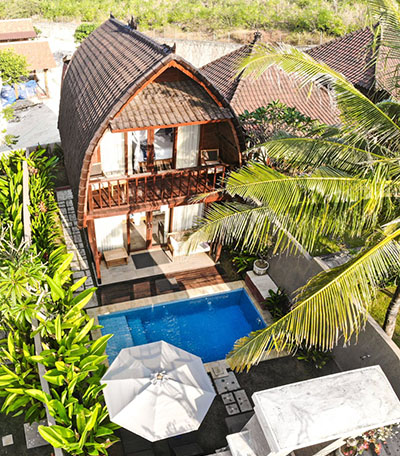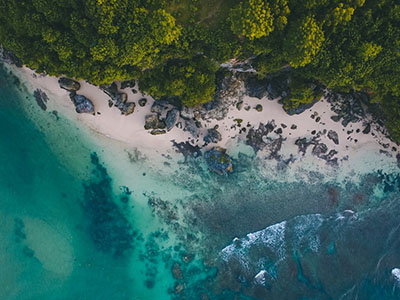
Ice Rehabilitation Options
Lasting Recovery in Tropical Bali
Crystal meth is highly addictive, and users of the drug should seek to break their habit immediately. Here we explain how ice rehab in Bali can help.
Although drug use among Australian adults has declined overall in recent years, ‘ice’ or crystal meth has seen a significant rise in use and abuse. Well over 1 million Australians have used meth at some point in their lives, and many of these people have become addicted.¹
In addition to its own considerable dangers, dependence on ice can also create a domino effect that leads to depression, anxiety, esteem issues and other psychological complications. Ice rehab is an important part of the solution – as long as people have access to this resource.
Despite growing needs, many people are forced to deal with their ice addiction without support. According to the Australian Institute of Health and Welfare, as recently as 2016, 1 in every 170 Australians received publicly funded treatment for Alcohol or Other Drugs (AOD).² This high demand leads to a shortage of supply – resulting in extended waitlists that of up to 6 months, limited public resources, and underfunded treatment systems.
The result:
Australian addicts and their families are often forced to seek ice rehab overseas in locations such as Bali.
Why Australians choose a rehab centre in Bali?
Famous around the world for its beautiful beaches with tranquil seascapes, Bali is an ideal location for those seeking ice rehabilitation. Recovering from a crystal meth addiction is by no means easy – but doing it in Bali will surely soften the blow, as the island’s relaxing vibes are excellent at keeping stress levels down. While attending ice rehab in Bali, clients can also participate in activities outside the rehab centre, such as mountain hiking, fishing, snorkelling, sightseeing, and more.
The best part?
Just a short flight from Australia, Bali provides a change of scenery that will comfort your mind and body. Its island setting, warm climate, and impeccable service culture make Bali well suited for ice rehabilitation. Bali’s rehab centres provide tailor-made addiction treatment programmes that deliver value for money. The admission process is swift, waitlists are short, and world-class treatment is available at affordable prices. In Bali, you can rest easy and focus on healing.
What can you expect from Bali ice rehab centres?
Ice rehab centres in Bali provide programmes of evidence-based treatment from professional therapists, often accompanied by alternative therapy to keep your mind at ease. Accommodation is comfortable at most centres, and is often provided alongside excellent nature views to help clients relax their minds. Rehab facilities in Bali tend to be on the small side, with 15 or fewer client beds available in most locations. The minimum length of stay at an inpatient rehab is 28 days; many clients opt for 60-day or 90-day treatment programmes.
Ice rehabilitation options in Bali
Bali has an excellent selection of ice rehabilitation options, at a variety of different price points. Client needs will be fully catered for, provided they choose an option that is well suited to their own unique situation. By providing a well-designed continuum of care, Bali ice rehabs keep their clients in good hands so they can receive the help they need at every stage of recovery.
Inpatient treatment
Private treatment
Aftercare

Secondary treatment
Secondary treatment may come in the form of sober living arrangements, or other types of outpatient treatment and long-term support. Because cravings tend to continue for 5-12 weeks after you stop using meth, this type of supplementary programme can help promote lasting recovery by helping addicts to maintain their sobriety as they adjust to life after treatment.
Take the First Step Towards Recovery
Treatment approaches to ice addiction
Assessment
Before enrolling in an ice rehabilitation programme, you will undergo an initial assessment over the phone with an addiction counsellor. As soon as you arrive at the centre, you will receive a full physical and mental assessment from the onsite doctor, followed by an additional mental health evaluation.
Ice users should be screened for psychosis and other co-occurring mental health symptoms that have been known to accompany ice addiction. Early diagnosis of psychological issues can dramatically improve treatment outcomes.
Psychological therapy
Psychological therapy is considered standard procedure for most methamphetamine treatment. Cognitive behavioural therapy (CBT) has proven particularly effective in the treatment of ice addiction, as well as any co-occurring disorders which may also be present. CBT helps to identify and correct problematic behaviour, replacing negative thought patterns with more positive alternatives. Ice rehab centres in Bali may also employ acceptance and commitment therapy, dialectical behaviour therapy, and motivational interviewing.
Withdrawal
The withdrawal phase occurs soon after a person stops taking a drug they are addicted to. In most cases, ice withdrawal takes longer than other drugs, and involves uncomfortable symptoms. It often takes two to three days for users to ‘come down’ before any withdrawal symptoms kick in at all – and in many cases, the symptoms of ice withdrawal are relatively mild.
Still, the detox process may last anywhere between one to five weeks depending on the level of dependence on the drug, the length of the addiction, and the age of the client. For mild addictions, most symptoms in this phase tend to resolve within two weeks and do not require heavy medication. Some rehabs provide detox onsite, with 24-hour medical support from an Indonesian medical team. Other rehabs send clients to an affiliated hospital for this part of the process.
12 step programmes
Depending on the rehab centre, this multi-step process may be adapted to secular sensibilities and integrated with other kinds of psychological interventions. The 12 steps emphasise self-growth, with constant guidance within a supportive environment. The 12 Step community is well established in Bali, and the majority of centres will take you out to community meetings as part of their ice rehabilitation programme.
Recreational activities
One of the many perks of ice rehab centres in Bali is that the island offers the perfect setting for activities such as hiking, surfing, spa treatments, and temple visits. These activities are part of a holistic approach to treatment, healing the mind and spirit while providing exercise to strengthen your body. As part of a treatment package, a healthy mix of recreation and therapy can make your journey to sobriety a relaxing and fun-filled one.
Make an Informed Choice
Choose a Rehab That Meets Your Needs
How much does ice rehab in Bali cost?
A range of options is available regarding rehab for ice users in Bali. Depending on the standard of accommodation and facilities you choose, inpatient rehab in Bali will generally cost from AU$7,000-15,000 per month of treatment.

How to find a rehab that meets your needs
- Regular individual counselling: This type of personalised treatment helps recovering addicts connect more easily with the rehab process, as they receive advice and support tailored to their personal situation.4
- Involvement of families and partners: Ice addiction often negatively impacts family relationships. Help with issues surrounding communication, attitude, supervision, and methods of interpersonal support can go a long way towards healing relationship issues and familial divides.
- Staff accreditation relevant to your condition: Having qualified and experienced therapists who specialise in drug abuse, especially ice, is essential for your journey to recovery. Many rehab centres in Bali operate with counsellors who were born and educated in Western countries, and are sensitive to the needs and expectations of foreign clients.
When is it time to attend ice rehab?
Need help finding a rehab in Bali?
For further information about ice recovery and addiction treatment options, browse our collection of rehab centres in Bali – or contact us directly. All conversations will be conducted privately and confidentially.
Grigg J., Manning V., Arunogiri S., Volpe I., Frei M., Phan V., Rubenis A., Dias S., Petrie M., Sharkey M. & Lubman D. I. (2018). Methamphetamine Treatment Guidelines: Practice Guidelines for Health Professionals (Second Edition). Richmond, Victoria: Turning Point.
Australian Institute of Health and Welfare 2018. Alcohol and other drug treatment services in Australia: 2016–17. Drug treatment series no. 31. Cat. no. HSE 207. Canberra: AIHW.
Jenner L and Lee N (2008). Treatment Approaches for Users of Methamphetamine: A Practical Guide for Frontline Workers. Australian Government Department of Health and Ageing, Canberra.
- Meier, P.S. and Best, D. (2006) Programme factors that influence completion of residential treatment. Drug and Alcohol Review, 25 (4). pp. 349-355. http://dx.doi.org/10.1080/09595230600741230
“Diagnostic and Statistical Manual of Mental Disorders (DSM–5).” American Psychiatric Association, www.psychiatry.org/psychiatrists/practice/dsm.
Leading Institutions We Abide By

